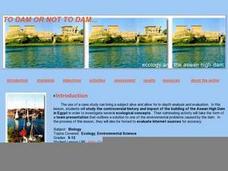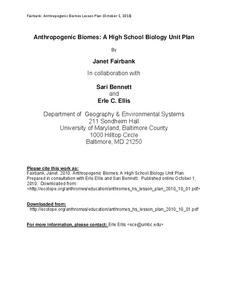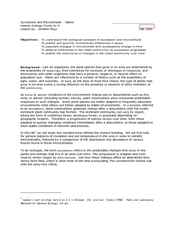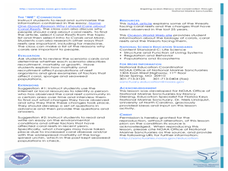Curated OER
The Biosphere
For this biosphere worksheet, students identify the different levels of organization that ecologists study. Students complete charts, sentences, and answer short answer questions.
Curated OER
Integrated Pest Management
Students investigate the different methods used in integrated pest management. In this biology lesson, students evaluate experiments and case studies on IPM. They discuss the pros and cons of using this method.
Curated OER
Biology: living Things and their Environment
Students recognize that organisms depend on other organisms. For this organism lesson, students understand symbiotic relationships and competition. Students explain food chains and food webs. Students understand that...
Curated OER
Chesapeake Bay Population Studies
Students determine how to use a quarter meter quadrant to find population density, relative density, frequency and how to calculate a diversity index while participating in a virtual field trip. They study how to establish a Correlation...
Curated OER
What Happens When Invasive Species Are Introduced
Helping students understand the dangers of nonnative species is an important part of ecology and environmental science lessons.
Curated OER
Environmental Issues
In this environmental issues worksheet, students are given 10 current topics that are problems in our environment today. They complete sentences about each topic by filling in the blanks with the appropriate terms. Some of the issues...
Curated OER
To Dam or Not to Dam
Young ecologists explore the Aswan Dam in Egypt via the internet. Each collaborative group is assigned a specific article about the ecological impact of the dam. Then they prepare a presentation to share with the rest of the class. Some...
Curated OER
Understanding Interactions Among Local Species and the Local Environment
Students examine the differences between biotic and abiotic factors, explain the difference between habitat and niche and compare how organisms get their nutritional needs. In this local environment lesson students trace the path...
Curated OER
The Environment and Interactions of Living Organisms
Students study the environment and interactions of living organisms. They identify abiotic and biotic factors and create a foldable and vocabulary cards. They create a poster illustrating soil and watch a video to study symbiosis.
Curated OER
Bluebirds Ecology Vocabulary Exercise
In this bluebirds worksheet, students categorize bluebird species found in their state and define vocabulary related to it. Students complete 6 vocabulary words.
Curated OER
Biome-Ecology Unit with a "Design a Zoo" Extension
Students participate in a three part unit about biomes. Part one, students research the biomes of North America and part two consists of research on zoos and a field trip to a zoo. While part three ties together the first two when...
Curated OER
Anthropogenic Biomes
If you teach a man to fish, he will never go hungry—or he will overfish and permanently damage the ecosystem? Address the traditional biomes as well as the human-included ecosystems and contrasts the biotic and abiotic factors in each....
Channel Islands Film
Human Impact on the Food Web of Santa Cruz Island
What happens when a non-native species is introduced onto an island? Santa Cruz Island, part of the Channel Island chain located off the coast of southern California, provides the perfect laboratory for young environmental scientists to...
Illustrative Mathematics
Logistic Growth Model, Abstract Version
Here learners get to flex some serious algebraic muscles through an investigation of logistic growth. The properties of the constant terms in the logistic growth formula are unraveled in a short but content-dense...
Virginia Department of Education
Ecosystem Dynamics
Searching for an eccentric way to enhance lessons on ecosystems while ensuring pupils remain creative and motivated? Upon viewing The Lorax by Dr. Seuss, designated groups design and construct a pop-up book that...
Curated OER
Physiological Adaptations
Students investigate the concepts of genetics and how it is tied to the variations found within different species and how it is tied to adaptations. They review the theory of evolution and factors found to help create variation. The...
Curated OER
Native Species Restoration: Is Saving One Species Hurting Another?
Students investigate the effect of human activities upon the environment. The studying experience encourages students to think about the issues involved in native species restoration.
Curated OER
My Favorite Meal
Students investigate ecological systems and the multiple uses of the environment by studying the osprey population.
Curated OER
Succession and Microclimate
Students compare the population of insects in different microclimates. In this biology lesson, students collect data using probes to tabulate temperature and soil data. They predict how certain parameters change as an area goes...
Curated OER
Benthic Macroinvertebrates
Students survey and describe a stream ecosystem. They sample the benthic macroinvertebrate populations of a given stream and determine community structure through the use of the Chandler Index and a species diversity index.
Curated OER
The Changing Coral Reef
Students record changes in the composition of a coral reef. In this Coral Reef lesson, students recognize the needs of Coral Reef species to survive. Students chart changes in population over time. Students write an essay...
Curated OER
Scavenger Hunt: A Group Collection
Students be complete a collection of living organisms and systems from the school campus.
Curated OER
Insect Biology and Ecology: A Primer
Students explore insects and closely related organisms. They examine the growth and development of a lady beetle. Students classify insects and organize them. They investigate pest management.
Curated OER
Living in Extreme Environments: Havens on the Deep Sea Floor
Students identify the characteristics of an extreme environment in the deep ocean and consider what organisms need to survive in these elements. They research sampling and data collection methods in this environment.

























